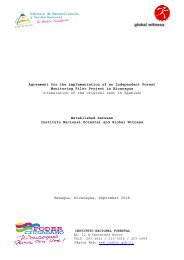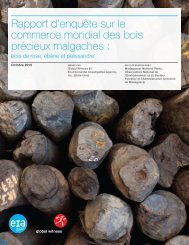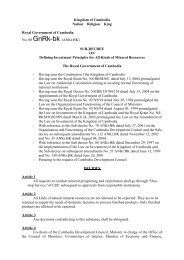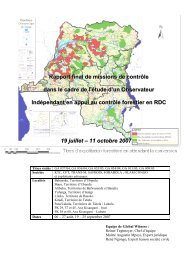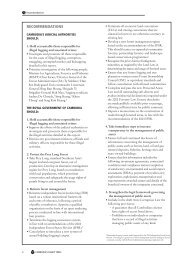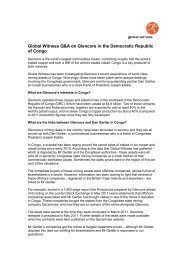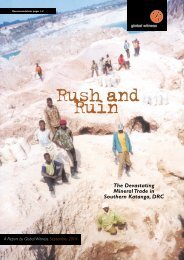03sep3 Conflict of Interests 60-89.pdf - Global Witness
03sep3 Conflict of Interests 60-89.pdf - Global Witness
03sep3 Conflict of Interests 60-89.pdf - Global Witness
You also want an ePaper? Increase the reach of your titles
YUMPU automatically turns print PDFs into web optimized ePapers that Google loves.
81<br />
Part Two: Logging in Burma / 19 The China-Burma Border<br />
Road building in China close to the Burma border. The truck is carrying timber<br />
from Kachin State.<br />
to the KIA that they must sign a ceasefire. 306 Certainly,<br />
after the collapse <strong>of</strong> the Communist Party <strong>of</strong> Burma in<br />
1989 and the signing <strong>of</strong> subsequent ceasefire<br />
agreements, border trade between the two countries<br />
increased, and border towns in Yunnan such as Ruili<br />
and Tengchong boomed from the trade in Burma’s<br />
natural resources. China also secured access to the<br />
Burmese market, providing China’s then failing<br />
industries with an outlet.<br />
There has also been an influx <strong>of</strong> Chinese into<br />
northern Burma, including many businessmen,<br />
especially into Mandalay. Estimates vary from hundreds<br />
<strong>of</strong> thousands up to over one million people, and<br />
30-40% <strong>of</strong> Mandalays population <strong>of</strong> 1.2 million is said<br />
to be ethnic Chinese. 307 This has caused resentment<br />
amongst many in Burma who see this as an invasion by<br />
China; part <strong>of</strong> a plan to take over parts <strong>of</strong> the country.<br />
Many <strong>of</strong> the Chinese interests in Burma remain veiled<br />
in secrecy so the full extent <strong>of</strong> Chinese influence is<br />
difficult to gauge.<br />
The SPDC is aware <strong>of</strong> the risks in depending too<br />
much on China. From its point <strong>of</strong> view Burma’s<br />
admission to ASEAN in 1997 was a means <strong>of</strong><br />
providing balance. The SPDC has also recently<br />
bought military hardware from countries other than<br />
China, most recently MiG fighter planes from Russia<br />
(see Bartering page 28). Burma has also strengthened<br />
its ties with India. These moves have irritated China.<br />
However, it will be difficult to reverse China’s<br />
influence not least because <strong>of</strong> Burma’s strategic and<br />
economic importance to a country that will not want<br />
this to happen. 308<br />
A CONFLICT OF INTERESTS<br />
19.2 Chinese-Burmese relations and<br />
Natural Resource Colonialism<br />
“As for the exploitation <strong>of</strong> forest resources<br />
from Northern Myanmar for export to China,<br />
transportation is much easier, costs are low and<br />
it is convenient to bring Chinese labourers into<br />
Myanmar to cut trees ... Myanmar has made<br />
several requests to us for the exploitation <strong>of</strong> its<br />
forest resources jointly with China....<br />
Importing timber from Myanmar has many<br />
advantages. Firstly, there are many species <strong>of</strong><br />
trees, in good quality, obtainable at a cheap<br />
price; secondly using timber from this source<br />
can support the increasing demands from<br />
China’s domestic markets and reduce the<br />
amount <strong>of</strong> the forest cut in Southwest China,<br />
thus protecting our environment. Thirdly, we<br />
can develop our timber processing industries<br />
(cutting <strong>of</strong> teak, producing wood fibre, paper<br />
mills, furniture manufacturing), and assist<br />
local economic development ... Myanmar is the<br />
only country in which we do not have to pay<br />
foreign currency (we can pay directly in<br />
Chinese yuan), for imported timber ... In fact,<br />
Myanmar is playing the leading role in<br />
compensating for the short-fall in the<br />
consumed volume <strong>of</strong> forest <strong>of</strong> Yunnan.” 309<br />
Chenwen Xu, academic, 1993<br />
China has four per cent <strong>of</strong> the world’s forest cover,<br />
ranking it fifth in global terms. However, with 22% <strong>of</strong><br />
the world’s population China has one <strong>of</strong> the lowest<br />
forest area per capita figures at 0.11 ha, compared to the<br />
world average <strong>of</strong> 0.77 ha. 310 The situation is similar in<br />
terms <strong>of</strong> both farmland and mineral resources. This<br />
weak resource base contrasts sharply with China’s<br />
increasing resource requirements in terms <strong>of</strong> its own<br />
growing and increasingly wealthy population and its<br />
increase in exports. China’s economy now stands at<br />
over $4.5 trillion, 3 22 times larger than it was in<br />
1978 311 and continues to grow at about 8% per year.<br />
In 1997 Yunnan’s economy was 100 times larger than<br />
it was in 1987.<br />
China needs Burma’s natural resources and it is this<br />
need for timber, gold and other minerals that has helped<br />
shape China’s policy towards the regime in Rangoon<br />
and the insurgent groups along the China/Burma<br />
border. Natural resource extraction in Burma has<br />
fuelled development in China’s Yunnan Province and<br />
China’s ability to import timber freely has been even<br />
more important since the imposition <strong>of</strong> its own logging<br />
ban (see page 83). It appears that in the minds <strong>of</strong> the<br />
Chinese policy makers the environment ends at the<br />
border, as they have shifted the ecological burden <strong>of</strong><br />
Chinese development to the people <strong>of</strong> Burma, in<br />
particular those living in Kachin State.<br />
It is also likely that a number <strong>of</strong> the deals are struck<br />
at a county or provincial level but it is not known to<br />
what extent these are influenced by the authorities in<br />
Beijing. The situation obviously has parallels with that





